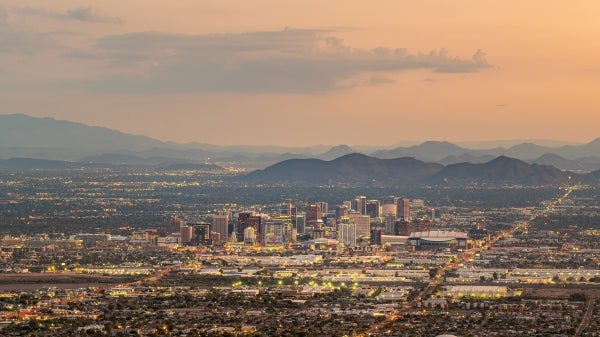ASU, SRP launch long-term strategic partnership focused on communities of the future

Photo by Deanna Dent/ASU News
More sustainable transit in the cities of the future. Improving water security via forest restoration. Expanding education in energy and STEM.
These research areas are part of a working relationship between Arizona State University and SRP, which the two have now formalized with a recently announced strategic partnership.
The partnership will focus on developing energy solutions and stronger communities of the future, with a core goal of comprehensively addressing resilience and adaptation to climate change.
“We deliberately focus on the future,” ASU President Michael Crow said. “Our organizations are well-positioned to collaborate with each other and across our communities to advance new ideas, new solutions and new ways of living and working to sustain the future of Arizona.”
ASU and SRP have worked together for more than 40 years to tackle issues facing the Phoenix metropolitan area, the state of Arizona and the Southwest region. The new partnership is an expansion of that work, specifically in three areas: education and workforce, sustainability and technology innovation.
“As ASU and SRP are both on paths for significant transition, it is vital we establish common goals, identify transferable insights and develop shared solutions,” CEO of SRP Mike Hummel said.
Workforce development is a key focus for ASU and SRP, two of the largest employers in Arizona. They have begun developing master's- and doctorate-level energy degree programs at ASU dedicated to transforming the energy sector, which itself is in a period of change with the growth of more sustainable energy sources and efforts to combat the effects of climate change. ASU is working with SRP to provide initial courses for a customized MBA program starting this year and SRP is currently soliciting staff interest for the initial classes this spring. The partnership also addresses education at an earlier stage, ASU and SRP are developing and making available K–12 programs that emphasize STEM-related career exploration and development.
Sustainability is another key area of the partnership. Highlights from the two organizations' work in 2020 include sharing findings from studies associated with accelerating fleet electrification and electric vehicle adoption in SRP’s service territory and among the ASU community. The partnership hosted a recent virtual seminar to discuss approaches to transportation electrification with members of the local community. ASU and SRP’s joint efforts will accelerate electrification of personal vehicles, buses and fleet vehicles — such as delivery vans — as well as the charging infrastructure needed to enable this transformation.
SRP also recently announced it is a founding sponsor of the global Low Carbon Resources Initiative, led by the Electric Power Research Institute (EPRI) and the Gas Technology Institute (GTI), and as part of its contributing efforts, SRP and ASU are developing demonstration and research projects to advance low-carbon technologies. These efforts will be accelerated with support from leading utilities and educational counterparts from around the world.
Statewide programs in water resiliency and water resource security are also among the partnership’s joint sustainability initiatives, with planned support from other Arizona universities and community partners. As part of this, ASU and SRP plan to expand their research and understanding of forest restoration impacts on the hydrology and water balance of Arizona’s watersheds.
“Many of these initiatives are ones we are already engaged in with SRP," Crow said. “Now, under the scope of a long-term partnership that explicitly outlines our goals, we have an enhanced foundation to cultivate these projects. This is just the start of what will continue to inspire our organizations to identify and implement innovative solutions to energy and environmental challenges our community faces.”
In the third area of focus, technology innovation, the partnership’s initiatives look at how best to support the future design of power systems — including identifying and implementing low-carbon technologies such as solar, biofuels and hydrogen to further reduce carbon from modern electricity generation. SRP and ASU hosted a virtual seminar with stakeholders from across the state to discuss four possible pathways that technology and infrastructure development can support a cleaner, low-carbon economy for Arizona. These pathways include broad electrification of transportation and other fossil-fuel uses, large-scale carbon capture options, building a hydrogen economy and addressing social equity issues related to these innovative transitions. This includes devising strategies to improve access to low-carbon solutions among low-income households.
“By joining forces, we accelerate our ability to witness and achieve significant improvement in future technologies for generations to come. We aim for our communities to be better positioned than ever before,” Hummel said.
More Science and technology

ASU researchers engineer product that minimizes pavement damage in extreme weather
Arizona State University researchers have developed a product that prevents asphalt from softening in extreme heat and becoming…

New study finds the American dream is dying in big cities
Cities have long been celebrated as places of economic growth and social mobility, but new research suggests that their role in…

Ancient sea creatures offer fresh insights into cancer
Sponges are among the oldest animals on Earth, dating back at least 600 million years. Comprising thousands of species, some with…